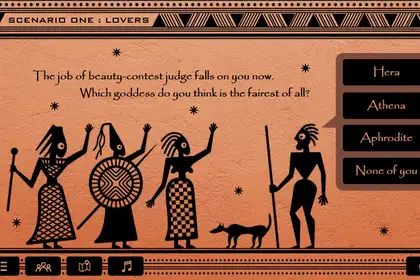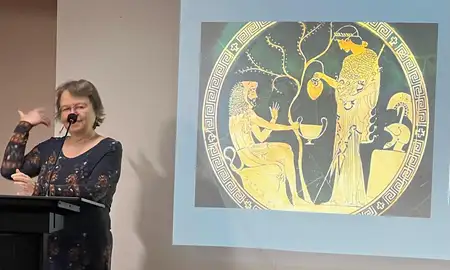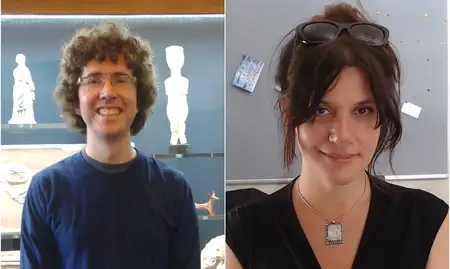
An image from the game created by Dr Gina Salapata, Dr Jonathan Tracy and Senior Learning Technologist Kevan Loke.
The brainchild of Associate Professor Gina Salapata, The Trojan War allows players to take on the role of different characters and make decisions which can change the canonical ancient version of events.
Greek born and raised, Dr Salapata likes variety and fun in her teaching. She also believes in the benefits of active learning to engage students.
The Trojan War is a collaboration between Dr Salapata, Lecturer Dr Jonathan Tracy and Senior Learning Technologist Kevan Loke.
“Jonathan teaches myth through literature and I teach myth through art. Classics is interdisciplinary, so I wanted to combine the two areas in this game. Jonathan worked mostly on the text and Kevan and I on the graphics," Dr Salapata says.
Both text and graphics are designed to appeal to contemporary students. The first scenario, 'Lovers', is the only one of the four planned game scenarios that is currently fully operational. Students can choose between being Paris, the Casanova of the ancient world, or Helen, the legendary beauty and wife of Menelaus whose abduction by Paris instigated the Trojan War.
In the game, one of the choices offered to Helen when choosing a husband is to remain 'single and fabulous' for the rest of her life. The outcome? The Trojan War is averted and Helen’s act of independence and self-reliance inspires Greek women to follow her example, ultimately bringing Greek patriarchy to an end.
Dr Salapata says one of the main aims of the game is to make students aware of the importance of individual choice.
"These choices all have far-reaching consequences, not just for the individual. Some decisions could prevent the Trojan War, others could stop it, and yet others could take it in a different direction."
At the end of each pathway, students have the opportunity to write a reflection piece and exercise their artistic talents by creating their own scenes using the geometric style of graphics seen on early Greek vases and featured throughout the game design.
“I wanted to create authentic graphics based on ancient motifs; to enter the mindset of an ancient eighth century artist who had to design the new scenarios we invented in that geometric style. That presents challenges because we had to follow certain conventions of the style, like avoiding overlapping figures. It was also hard to create new scenes, because there are no ancient models for everything we wanted to depict.
“For example, we had to piece together elements from unrelated scenes to create a dark threatening environment in our scene of the underworld, because nothing like that exists in early Greek art. But that was part of the fun," Dr Salapata says.

Dr Salapata presenting at the Australasian Society for Classical Studies conference in Christchurch in January.
She estimates it will take another year of working in their free time to complete the remaining three scenarios: 'Kings' with Priam or Agamemnon storylines, 'Warriors' with Achilles or Hector, and 'Survivors' with Odysseus or Penelope. She is already playing with the idea of a follow-up Trojan War board game or possibly a fold-out book. Dr Salapata and her colleagues have produced a 3D-printed Paris figure based on the game graphics, which to her amazement has come out looking very similar to eighth century figurines.
“It shows us how technology can open up new possibilities in teaching humanities. We can help students to seriously engage with the ancient world in creative and unconventional ways beyond traditional classroom learning.”
This year, there are more than 260 students enrolled in Massey’s first year courses in classical studies. Gina says interest in the discipline is still strong worldwide.
“There are so many legacies from the classical world, enriching every facet of our modern life and civilisation: our legal and political institutions, education system, science and technology, art and architecture, and every medium of storytelling including books, comics, movies, TV series and computer games.
“Because it is interdisciplinary, our field provides a big picture of the Greek and Roman cultures from multiple perspectives. We explore literature, history, art; but also religion, politics, philosophy, science – you name it. We also examine the interactions between these two cultures and their neighbours.
“The philosopher Socrates said that the unexamined life was not worth living. The Greeks and the Romans asked, often for the first time, important questions we still ask today. What does it mean to be human? Is there life after death? What is justice, or what constitutes happiness?
“In our times we face similar problems and challenges to those the ancients faced - issues of gender and ethnic identity, multiculturalism, armed conflict, imperialism and colonialism. Studying how the ancients responded to these complex challenges can help us to find solutions to our own problems.”
As well as launching the Trojan War game pilot, the classical studies programme is marking its 50th anniversary with a series of events through the year, including fortnightly articles in the Manawatū Standard newspaper looking at the Greek and Roman origins of commonly used words such as iris, music or census.
“I learn a lot myself through these projects. I love it," Dr Salapata says.
Related news
A divine gift: wine drinking in Ancient Greece
Associate Professor Gina Salapata spoke at the Symposium of Gastronomy late last year about the wine-drinking history of the classical Greek symposium.

Opinion: When the dead walk the earth
Dr Jonathan Tracy and Dr Amy Whitehead write about the rituals and practices surrounding Hallowe’en.
